

How to Use Student-Generated Questions to Promote Deeper Thinking. You’ve seen a penny hundreds, if not thousands, of times.
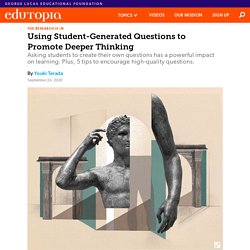
But can you draw one from memory? In a famous decades-old study, adults were asked to draw a U.S. penny without any aids. Although they were confident that they knew what a penny looked like, their performance on the test was “remarkably poor.” And when shown pennies with slightly different characteristics, such as misplaced text or with Lincoln’s portrait facing the wrong direction, few were able to identify the inaccuracies. It’s a maddening quirk of human memory: We’re often convinced that we know something, but upon closer examination, it’s just an illusion. Understanding how people learn and reliably commit things to memory is what prompted psychology professor Mirjam Ebersbach and her colleagues at the University of Kassel to study how students prepare for an exam, and what strategies yielded the optimal improvements in student learning.
One week later, all of the students took a test on the material. How to Choose Words That Motivate Middle and High School Students During Online Learning. Self-motivation.
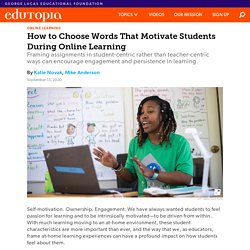
Ownership. Engagement. An Antiracist Roadmap for Discussing Tough Topics in Middle and High School Classes. Discussions about racism and how to proactively address it are happening among White educators, and that’s a good thing.
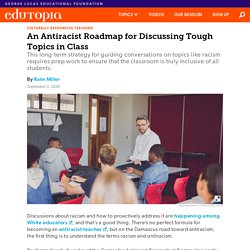
There’s no perfect formula for becoming an antiracist teacher, but on the Damascus road toward antiracism, the first thing is to understand the terms racism and antiracism. Dr. Ibram Kendi, founder of the Center for Antiracist Research at Boston University and author of the book How to Be an Antiracist, defines racism as the “marriage of racist policies and racist ideas that produces and normalizes racial inequities.”
Antiracism is the opposite—measures that eliminate racial inequity on the basis that racist policies are the cause of racial inequities. Six tips for running online courses. Online teachers must also be moderators.
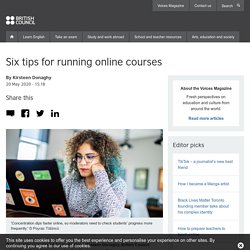
Kirsteen Donaghy, British Council e-Learning Consultant, shares her tips for running online courses. Be sensitive to learners’ digital literacy With endless possibilities from online tools, it’s easy to get carried away. For examples, by asking learners to annotate on the shared screen, add their own image, save this, upload that, go into breakout rooms...
Mindset+Grit. Arbetsmiljö + stress. Mentorskap. Tips From Principals for Better Teacher Evaluations. Evaluating teachers is part of the regular rhythm of the school year, but it can also be a valuable moment for administrators to improve instruction and learning, writes Denisa R.
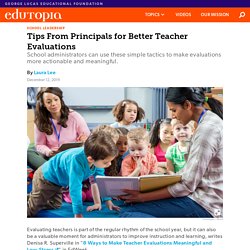
Superville in “8 Ways to Make Teacher Evaluations Meaningful and Low-Stress” in EdWeek. Don’t rely only on the observation. “Before you even set foot into the classroom for a planned observation, sit down with the teacher to discuss the upcoming lesson that you'll observe and what you should expect,” Superville says. Are there specific goals the teacher hopes to accomplish? 4 Key Aspects of Teaching a K–12 Online Class. Building a successful virtual learning program can help teachers and students grow.
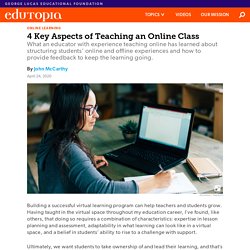
Having taught in the virtual space throughout my education career, I’ve found, like others, that doing so requires a combination of characteristics: expertise in lesson planning and assessment, adaptability in what learning can look like in a virtual space, and a belief in students’ ability to rise to a challenge with support. Ultimately, we want students to take ownership of and lead their learning, and that’s even more necessary in a virtual space. Downloadable Materials — The Learning Scientists. About the six strategies for effective learning resources: These resources were created based on research from cognitive psychology from the past few decades.
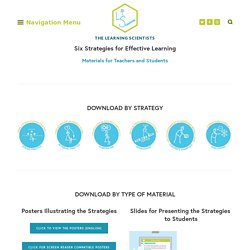
To learn more about how we created the materials, see this blog. Mr Perswall. Famous Quotes - DoTheDifficult.org - Quotes & More. The surprising truth about what motivates us. Motivation is literally the desire to do things.
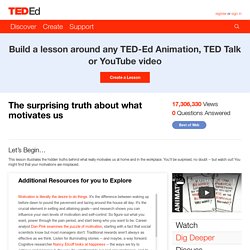
It's the difference between waking up before dawn to pound the pavement and lazing around the house all day. It's the crucial element in setting and attaining goals—and research shows you can influence your own levels of motivation and self-control. So figure out what you want, power through the pain period, and start being who you want to be. Career analyst Dan Pink examines the puzzle of motivation, starting with a fact that social scientists know but most managers don't: Traditional rewards aren't always as effective as we think. Listen for illuminating stories -- and maybe, a way forward. How to Choose a Co-Teaching Model. 6 Models of Co-Teaching: Pros and Cons One Teaching, One Observing: As a supervisor, I’ve seen this model implemented both with purpose and without.
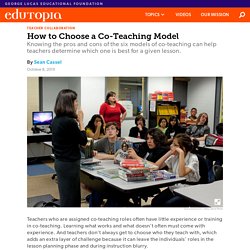
It takes time to develop a working relationship with another teacher. When the relationship isn’t working, this model appears more often, and often without purpose. When one teacher is directly instructing the students, the other should be observing. The observing teacher is collecting data, which can be useful in determining what instruction takes place next, which students need additional help, and what co-teaching model may be used next to address any identified needs.
Pros: less time collaborating, less interruption, more focused and purposeful data collection. Peer Coaching: Tapping Into the Expertise of Fellow Teachers. In my travels to schools around the world, I have yet to encounter educators who wouldn’t benefit from peer coaching as an approach to professional learning.
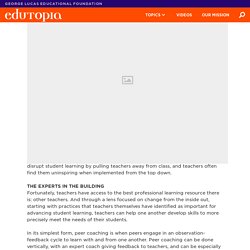
As in any field, professional learning should support teachers in improving their practice—there’s no point investing resources in professional learning if it’s not going to make a difference in what happens in classrooms for students. Professional learning needs to focus on the right work that’s going to impact teacher practice and student learning. Unfortunately, professional learning hasn’t always been effective or focused on teachers’ real problems of practice. Traditional models can be expensive and often disrupt student learning by pulling teachers away from class, and teachers often find them uninspiring when implemented from the top down. The Experts in the Building. Tydligt målfokus viktigt i formativ bedömning.
How to Increase Participation By Asking Better Questions. What do you do when your question is met with blank stares? In “When You Get Nothing But Crickets,” Jennifer Gonzalez of Cult of Pedagogy shares a few ways to avoid those long, awkward silences after you pose a question. First, determine why you are not getting any responses. Gonzalez says it boils down to one issue: “Getting the silent treatment from a group you’re speaking to happens most of the time for one basic reason: People don’t want to look stupid.” Helping Students Develop Executive Function Skills. Executive function is an umbrella term in neuroscience to describe the neurological processes involving mental control and self-regulation. Executive functions control and regulate cognitive and social behaviors like controlling impulses, paying attention, remembering information, planning and organizing time and materials, and responding appropriately to social situations and stressful situations. Experts believe executive function is regulated by the frontal lobe of the brain—the prefrontal cortex.
Because humans are born with brains that are not fully developed, children are not born with these skills, but they have the potential to develop them. Three Ways To End The School Year Strong. Given this research, it’s particularly important for us teachers to be strategic about how we end the school year with our students – it can have an outsized influence on not only how they feel about our class, but also about how they approach school in the future, too. Here are three ways I try to increase the odds of my English Language Learner students feeling energized about the final month of school: Set Last-Month Goals. Hur vi kan stödja och vägleda en elev genom gymnasiet för att göra eleven redo för gymnasiearbetet (och fortsatta studier)? – Specialpedagog på gymnasiet. De vill koppla hjärnforskning med undervisning. Designing Lessons to Boost Student Engagement in High School. Ensuring That Instruction Is Inclusive for Diverse Learners With Universal Design for Learning.
Humans have a tendency to fall into patterns of behavior. For teachers, that means that if we’re not careful, we begin to teach things the same way every year. This is comfortable for us, but it can result in a rigid curriculum that may not work for all students—and traditional classrooms are curriculum-centered already, not easily adapted to the differing needs of individual students. Instead, students are required to adapt to the curriculum. As a special education teacher, part of my job was helping students who had a diagnosed learning disability access the general education curriculum, so I frequently found myself co-teaching with a math or English teacher. When students with learning differences are placed in the general education classroom, they often receive accommodations and services. Teachers in this situation may become frustrated because trying to accommodate each child individually creates a lot of stress and often an unmanageable workload. 1.
Creating a Culture of Frequent Reflection to Improve Student Learning. We know that reflection increases student learning. It supports growth mindset and encourages students to improve and learn from their mistakes. We may engage our students in reflection in our classrooms, but it’s not often habitual—I know I’ve been guilty of treating reflection as an event rather than as something we do all the time. With all the challenges of teaching content and assessing learning outcomes, we can fall into the trap of skipping the reflection. Allowing Test Retakes—Without Getting Gamed. Debates about exam grades and retaking tests tend to coalesce, eventually, around the same arguments.
4 Ways to Boost Student Engagement With Movement in the Classroom. Lesson Study: Personalized, Research-Based Professional Development. Inkludering – en rättighet. Debattörerna: Lotta Holme, universitetslektor, Linköpings universitet Alma Memisevic, doktorand, Linköpings universitet. Watch - Upptäck. Vad? Hur? Varför? Stör- eller stödfunktion? – en rapport om lärplattformar.
Skenande kostnader, merjobb och frustration. Lärplattformarna ska bidra till en mer effektiv dokumentation och ge stöd i elevernas kunskapsutveckling. Åsa Plesner - Why Are Teachers So Tired - researchED Haninge 2019. Myten om pennan, eller varför man inte ska ”tro” på forskning utan läsa det finstilta. Digital kompetens i förskola, skola och vuxenutbildning. Lärares kompetensutveckling kring digitaliseringsfrågor är fortfarande stort, men har skiftat fokus. Det visar Skolverkets första rapport kring uppföljningen av den nationella digitaliseringsstrategin. Till rapporten Digitala lärarutbildningsguide ska få fler till läraryrket. Series of Posters That Show What Women Should ‘Thank A Feminist’ For artFido. Classroom Management Tips for Co-Teachers. The old adage “two heads are better than one” holds special significance in the classroom. Thoren Framtid Karlstad - Grundskola - Inlägg. Skolan kör med förbundna ögon ner i digitaliseringsträsket.
Använd hjärnan rätt med tysta genomgångar. Den brittiske matematikläraren Craig Barton ändrade sin undervisning efter att ha studerat forskning kring hjärnan och lärande. Han började bl,a. använda sig av tysta genomgångar. Watch - Upptäck. Building a Metacognitive Classroom. 500 Internal Server Error. Decoding the Teenage Brain (in 3 Charts) Del 1 av 10. Vad innebär egentligen systematiskt fokus på bättre och bättre undervisning. The 5 Priorities of Classroom Management. Why Students Forget—and What You Can Do About It. Teachers Learning From Each Other. Learning to Be Flexible. Vad vi pratar om när vi pratar digitalisering. The school using giant book murals to encourage reading.
Umeå testar nya rum för lärande. Ingrid Fetell Lee: Where joy hides and how to find it. Putting Teacher Action Research Into Action. Edutopia - Make Learning Stickier. Fysisk lärmiljö: Att optimera för trygghet, arbetsro och lärande - Magelungen. When Students Lead Parent Conferences. Start - Pep Skola. Project-Based Learning and the Research Paper. Ed.ted. Så lyckas du på medarbetarsamtalet. Undervisning i källkritik granskad - Tankar om skolan i media.
Edutopia - Teaching Kids How to Speak and Listen. A Strategy for Effective Student Collaboration. Empowering Students to Curb Bullying. Why Students Cheat—and What to Do About It. New Teachers: Classroom Management Essentials. 3 Fun Strategies for Note Taking. Edutopia - Learning walks—aka instructional rounds—are a... Hur ska barnen lära sig något om de ingenting kan? - Mikael Bruér. UR Samtiden - ResearchED 2017: En students resa genom lärandet - UR Skola. Strategi: Stoppskylt – Kooperativt Lärande. Planera och strukturera undervisning. Samtalsmodeller för kollegialt lärande – NORDSTRÖM EDUCATION. TEG SV123 Lässtrategier - Google Slides. Föreläsning med Adrienne Gear: Att läsa faktatexter. Läsårsreflektion i ämnesgruppen. Koden till bättre lärande.